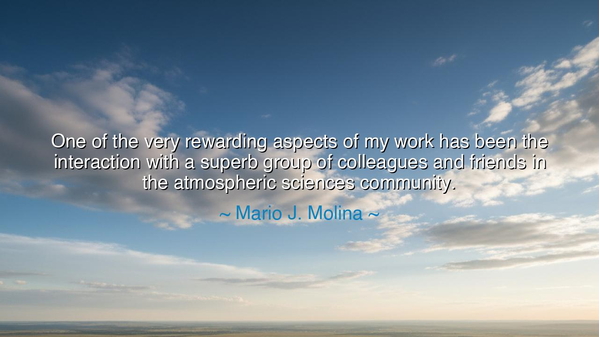
One of the very rewarding aspects of my work has been the
One of the very rewarding aspects of my work has been the interaction with a superb group of colleagues and friends in the atmospheric sciences community.






Hear now the words of Mario J. Molina, Nobel laureate and guardian of the skies, who declared: “One of the very rewarding aspects of my work has been the interaction with a superb group of colleagues and friends in the atmospheric sciences community.” In these words shines a truth that echoes across the ages: that the greatest victories of the human spirit are not won in isolation, but in fellowship, in the sacred bond of minds united in purpose.
The meaning is profound and tender. Molina does not point first to his own triumphs, though he was among those who revealed the peril of the ozone hole and stirred nations to action. Instead, he lifts his voice in gratitude for colleagues and friends, for the joy of shared labor. He reminds us that knowledge, though precious, grows best when cultivated in community. The solitary genius may imagine, but it is the chorus of many who transform discovery into salvation.
The origin of this statement lies in the history of science itself. Mario Molina, born in Mexico and driven by curiosity, devoted his life to studying the invisible forces that govern our air. Alongside Sherwood Rowland, he discovered the danger of chlorofluorocarbons, those seemingly harmless compounds that threatened to unravel the shield of ozone protecting the earth. Yet this victory was not his alone. It was the fruit of collaboration with scientists across the globe, who together sounded the alarm and forged international agreements to preserve life itself. Thus, his words are not mere politeness but lived truth: the community of science is as vital as the discovery itself.
History gives us other voices that affirm this truth. Think of the architects of Apollo, who sent humankind to the moon. No single man or woman could have achieved it, but together—engineers, pilots, scientists, dreamers—they reached beyond the earth. Or recall the translation of the Septuagint in Alexandria, where many scholars labored as one to give wisdom to the world. In every age, the most enduring triumphs spring from the collective, from the strength of bonds formed in mutual purpose.
The lesson is clear: the joy of work is multiplied when it is shared, and the burden of labor is lightened when carried by many. Seek not only solitary excellence but also the company of those who sharpen your mind and strengthen your heart. The prize of great endeavor is not only the outcome achieved, but the friendships forged along the way. In them lies the true reward, the treasure that endures long after medals tarnish and records fade.
Practical wisdom follows. If you labor in any field, seek out companions who share your vision. Learn from them, teach them, encourage them, and rejoice in their success as in your own. Build communities where knowledge flows freely, where respect nurtures growth, and where friendship tempers ambition. Do not isolate yourself, for isolation withers the spirit. Instead, weave your strength into the fabric of a team, and together you will achieve more than any could alone.
So let Molina’s words be remembered as a guiding star: honor your colleagues, cherish your friends, and recognize that the greatest discoveries are not only about the world we study but about the bonds we form in the pursuit of truth. For the earth was preserved because many worked as one, and the skies above remain guarded because fellowship made science strong.
Thus, O seekers of wisdom, carry this teaching into your own journey: strive for excellence, yes, but never forget that excellence shines brightest when it is shared. In friendship and in community lies the true reward of labor.






DNDuong Dung Nhi
Mario J. Molina’s quote highlights the powerful role that relationships play in scientific discovery. It makes me think—do scientists and researchers find it easier to innovate when they have a solid, supportive community around them? How do you foster a collaborative environment in a field that requires intense focus and individual thought, while still benefiting from teamwork and collective knowledge?
PKPhuong Kim
I really resonate with Mario J. Molina’s appreciation for the community within his field. It’s clear that collaboration and shared expertise are key to his success. How do you think professional communities impact personal growth? Do you believe the best work comes from individuals, or is it more likely to emerge from strong, collaborative environments where everyone is constantly learning from each other?
QLQuynh Luong
This quote from Mario J. Molina made me reflect on the value of collaboration and shared knowledge. In fields like atmospheric sciences, where complex problems require innovative solutions, having a group of passionate and talented colleagues seems essential. How do you think teamwork influences progress in scientific research? Can breakthroughs happen without close collaboration, or are they mainly a product of collective effort?
TNHuynh Thi Nguyen
I love how Mario J. Molina emphasizes the reward of interacting with a brilliant group of colleagues in the atmospheric sciences community. It makes me think about how often success in any field is dependent on the people you surround yourself with. What do you think is the most important aspect of building a strong professional network? Is it about sharing ideas, mutual support, or something else?
XHXuyen Huynh
Mario J. Molina’s recognition of the importance of collaboration in his work is truly inspiring. It highlights how critical it is to have a supportive and knowledgeable community around you. How do you think a strong professional network impacts the quality of one’s work? Is it possible to reach similar levels of success without the support of like-minded colleagues, or does that interaction play a crucial role in advancing one's career?